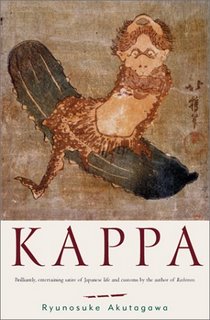Akutagawa Ryunosuke
 The most obvious example of kappa in Japanese literature is the story "Kappa," written by Akutagawa Ryunosuke in 1927, the same year in which he took a dose of veranol and thus his life. "Kappa" is narrated by Patient 23, an institutionalized man who tells the story of his journey to the land of kappa, his adventures there, and a brief glimpse into what happens after his return. The story is a thinly veiled satire about Japanese society in the 1920's and covers topics such as marriage, socialism, labor shortage and censorship in a fantasic, amusing world. It was also an avenue for Akutagawa to explore his mental state.
The most obvious example of kappa in Japanese literature is the story "Kappa," written by Akutagawa Ryunosuke in 1927, the same year in which he took a dose of veranol and thus his life. "Kappa" is narrated by Patient 23, an institutionalized man who tells the story of his journey to the land of kappa, his adventures there, and a brief glimpse into what happens after his return. The story is a thinly veiled satire about Japanese society in the 1920's and covers topics such as marriage, socialism, labor shortage and censorship in a fantasic, amusing world. It was also an avenue for Akutagawa to explore his mental state.These kappa have a society of their own, very similar to that of the Japanese. They have theatres, artists, historians, capitalists, and wars with the otters, and they have a love of new inventions. They even wear glasses and have their own language, although they understand and speak Japanese as well. Much like in the myths, the kappa in this land are benevolent teachers and always trustworthy, but a subtle disturbing quality still hangs about them. Perhaps Akutagawa chose the kappa as his subject because they have a dangerous like the society he was commenting on.
For those who have not read it, "Kappa" is an vivid, imaginitive story that will hopefully make the reader question what they've read, and it's a short, easy read.


0 Comments:
Post a Comment
<< Home